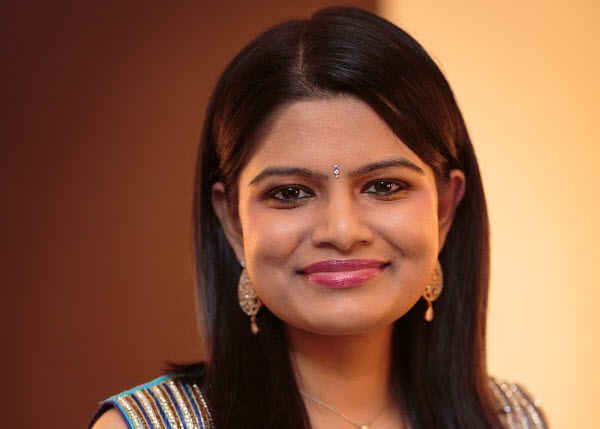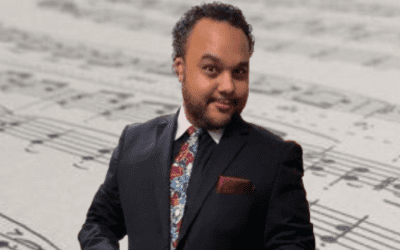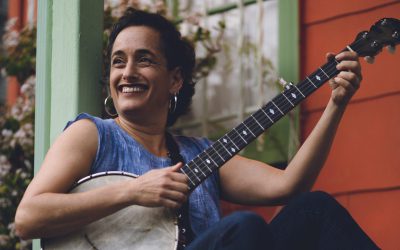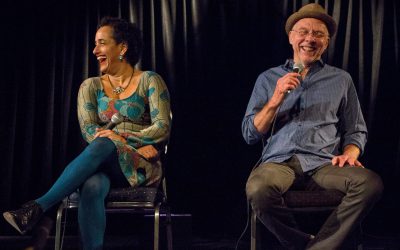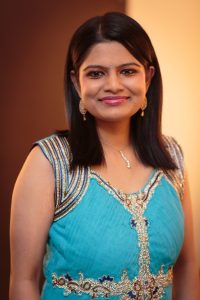
Vocalist, Vidya Srinivasan.
Classically trained from a very young age, Vidya Srinivasan shares her story as an Indian classical music singer. Later in her life, she turned to the sciences and a career working in high tech. Srinivasan grew up in India and then came to the U.S. for graduate school to study computer science. But her reasons for the changing from professional artist to tech worker may surprise you!
In this part 1 of a two-part interview, Vidya shares:
- How her mother instilled a love of music in her from a very early age
- A performance of 4 types of music, including a Carnatic song in Telugu and film songs
- How she used music in times of great life transition after she came to the U.S. for graduate school and beyond
- How the arts are regarded in India vs. the U.S.
- Her varied life balancing music, a career in technology, motherhood and a passionate dedication to diversity and inclusion efforts for women, including being the General Chair of the Grace Hopper conference for the past 3 years.
Biography:
Vidya Srinivasan was introduced to the world of music at age 2 by her parents. Enrolled in music school at age 3 to learn Carnatic music, she gave her first solo concert at age 5. She holds a degree in Carnatic music. Vidya has performed in 4 Indian TV shows in Tamil and Telugu and numerous stage shows. Her voice appeared in Sapthaswarangal and Ennodu Paatu Paadungal, both popular Tamil reality music TV shows.
Vidya sings in 4 different languages and likes to experiment across different music types to create hybrid mashups. Music is her favorite escape from her work in technology and Vidya often opens her tech talks with a song.
Vidya has been the General Chair of Grace Hopper conference since 2019. Her love of tinkering with tech and has won her awards at Hackathons and so far she has filed 21 patents for her work.
To listen to this episode as a podcast, search for Agile Vocalist wherever you get your podcasts.
Want more? Listen to part 2!

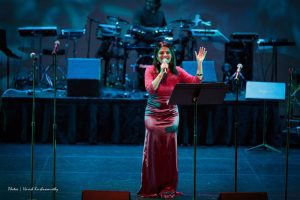
Vidya Srinivasan performing on stage. Photo by Harish Krishnamurthy.
Did you enjoy this episode? We hope so! Subscribe to hear future interviews not just with singers, but also with sound makers and the powerful ways sound touches life.
Episode Transcript:
Intro: Welcome. Listen to this next Agile Vocalist podcast.
[music]
Host: Vidya Srinivasan was introduced to the world of music at age two by her parents. Her mother taught her the sapta swaras or seven notes in music. She was enrolled in music school at age three to learn Carnatic music, a form of Indian classical music. She gave her first solo concert at age five and holds a degree in Carnatic music. Since then, Vidya has performed in four Indian TV shows in Tamil and Telugu and numerous stage shows. Her voice appeared in Sapthaswaragal and Ennodu Paattu Paadungal, popular reality music and short films in Tamil.
Vidya learned Carnatic music under the tutelage of renowned singers like Mrs. Kunnakudi Subbalakshmi and Mr. Ajay Namboodiri. After moving to the US for higher studies, Vidya started performing with Indian bands at charitable events and Indian cultural celebrations in both North Carolina and Washington. She sings in four different languages and likes to experiment across different music types to create hybrid mashups.
Music continues to be Vidya’s favorite escape from her work with Facebook, and she often opens her tech talks with a song, always a hit with audiences.
Host: I guess my first question is, why don’t you share a little bit about how did you get started with the passion of singing and music?
Vidya Srinivasan: My choice of getting into music was totally not mine. My mom was really interested in music since her childhood, and she really wanted to kind of pass it on to me, so she enrolled me in a music school, I think, at two and a half or three years of age. It was an age where I could not really grasp what was happening. I couldn’t really sing, but I had a good ear for music. She tells me these fond memories of where she used to take me to the music class and make me sit every week for like an hour, just so that I see other people singing, that’s it.
Host: Oh, interesting. Okay.
Vidya: Then I come back. She knows, like she learned a bit of music. She used to teach me at home. That’s how I kind of started. I don’t really remember a childhood without music in it.
Host: Ah, I see.
Vidya: I grew up with music. It’s a very obvious thing to me. I went to music school first even before going to kindergarten.
Host: Wow. Against my better wishes, we dragged my daughter in diapers to chorus rehearsals, and I found that very difficult because I felt like I needed to be responsible for her and make sure she didn’t upset the other singers, but yes, she became musical before she was potty trained.
Vidya: I’ve read so many studies around how getting exposed to music at a young age can actually help your brain develop very differently.
Host: Yes.
Vidya: For one, I’m so thankful that music became a part of my life at such a young age, because I really cannot imagine a life without music now. [crosstalk]
[song]
Vidya: What I want to do now is take four different languages, four different musical songs, and then sing a snippet in each of that to show how diverse music is and music can actually be and how privileged we are actually to live in a world that is filled with such diverse music. I’m going to start with a Carnatic song which is in the language Telugu, which is one of the regional languages in India, and then follow that up with a Tamil film song which talks about how beautiful the nature around us is, follow that up with a melodious Hindi film song, and then close it out with a powerful song by Adele in English. Okay?
Host: Great, thank you.
Vidya: What we’re using right now is called a shruti, which gives a sense of the right pitch for musicians. Singers in both Carnatic and Hindustani, which are the two distinct classical music forms in India, use some form of shruti to help us understand what the right pitch is. Here’s the first one.
[Vidya sings a Telugu song]
Now we’re moving on to the Tamil song which talks about how beautiful the nature around us is.
[Vidya sings a Tamil song]
Now we move on to a Hindi song. It’s about love.
[Vidya sings a Hindi song]
Then we close it out with Adele’s, who is one of my favorite singers, song.
[Vidya sings an English song]: Let me photograph you in this light in case it is the last time that we might be exactly like we were before we realized we were sad of getting old, it made us restless, it was just like a movie, it was just like a song when we were young.
Host: Do you want to fast forward a little bit to getting a master’s in computer science? I think part of the story that I’ve researched about you is that music was a healer for you and it was tied into your journey getting a master’s degree. You want to tell that story?
Vidya: Yes. For me, I think in India through my schooling, through my college, I was always a part of some or the other band. In schools, we used to have a school band, and I was a singer there. In college, we had a college band, and we used to compete. We had so many different– inter-college competitions, competitions that you just go and compete and sing, and I was experimenting a lot. Especially during my bachelor’s in India, I sang in four different TV shows.
Host: Wow.
Vidya: I experimented quite a bit, I would say, both Carnatic, which is one of the Indian classical music forms, as well as working with independent artists and singing for short films and stuff, as well as experimenting with film music and stuff. I did quite a bit of that, and I’ve always wanted to pursue both, like tech and music. I’ve always wanted to– I never wanted to choose one because I guess back in that time, I just did not know which one I liked more, I liked both equally.
When I came to the US here, all of a sudden– First of all, I was in a different continent than my family, and I came with two suitcases, and that’s all I had. I had to do everything on my own, which is not something that I’m used to. In India, you have a very big support system who help you with pretty much everything. Over here, I had to do my own laundry, I had to do my own cooking, I had to do my own cleaning, I had to do my own studies. It was a lot, it was quite [crosstalk].
Host: Another country.
Vidya: A very different culture. Grad school was– I came to grad school without having any work experience, so I literally graduated with my bachelor’s in May and then flew to the US in July.
Host: Wow.
Vidya: I didn’t really have, the right word I think right now, if I look back now, is maturity. When I looked at my peers who had worked for four years, I even had a few who were married and had kids, who came and did master’s with me, who were my classmates.
I was in a very different mindset, but music I think definitely helped me through the journey because I had to adapt to a very different culture, I had to adapt to a very different lifestyle, and the one constant I did have with me was music.
[Hindi song]
Vidya: I remember the days, there were days when I used to have an exam or something, test or something the next day, and I used to get stressed, and I used to go, like just put on my EarPods/headphones and listen to music to calm myself. There were times when I felt homesick, I missed my mom, I missed my dad, and I felt like crying.
I think I even used music to vent out my feelings, to cry and to feel better because when you’re coming to a different continent, you miss your family, you miss your friends, you miss all the fun you had, especially during festival seasons.
Host: Absolutely.
Vidya: India was– it was beautiful, and over here, it was cold, and it was snowing, which is beautiful now. I appreciate all of it now, but back then, I was like, “Why am I not with my family and friends celebrating Diwali?”
Host: This is North Carolina, right?
Vidya: Yes, this was in North Carolina. In all of those times, the one constant I did have with me was my music. I had amazing friends, friends who truly are family, were family, are still family to me, but you still sometimes need your own space to process all the emotions and figure out and then march towards the goal that you came here for. I use music for getting motivated, I use music for calming myself, I use music to cry, I use music to be happy. I have a song for everything.
Even now if I’m sad, there’s a particular song I listen to, and I cry it out, I guess, and then the next [crosstalk].
Host: What language is that song in?
Vidya: It’s actually a Hindi song. It’s called Luka Chuppi, it’s sung by Lata Mangeshkar who’s a melodious queen of music in India. She is, Oh my God, her songs truly move you. Luka Chuppi is from a film called Rang De Basanti, and it’s a song where a mom loses her son, and she sings saying, “Where are you? I’m actually searching for you, but you’re not around me.”
Host: Oh my gosh.
Vidya: The situations that I– I definitely was not in that situation, but it’s not the song, it’s not even the words for me, it’s the depth of the song and the voice that [crosstalk] melody progresses, it automatically puts you in a very different zone. Once I graduated, I started my career at Microsoft, and I had to leave my second home, which was North Carolina, and moved to Seattle, which was the other end of the coast, and it was starting from scratch all over again. I had no friends when I came here, all my– Grad school, you bond-
Host: Of course.
Vidya: with the community, and then everybody just went to different places around the country as they found their jobs, and again, I used music to help me figure it out.
Host: Sure. Sure, sure, sure. Can you talk a little bit about– This is an interesting one now, given the context of one coast, the East Coast of the US and the West Coast of the US, and a new continent, coming from India. Can you talk about what you see about how the arts are regarded in India, where you’re from, and how they’re regarded in the US?
Vidya: This again, based on my limited exposure, I would say, definitely not a generic statement, but what I observed was, in India, especially in South India where I come from, arts are very deeply imbibed into your upbringing. Everybody I know of, in my family, my friends, in my community, were motivated and encouraged to learn some form of arts, be it singing, be it dance, be it an instrument. It was a given almost, like if you just went to school, people would be like, “You just go to school? What? You don’t do anything else?”
It was a very– We didn’t know another way. I think that’s a better way to put it.
Host: Well, I’m curious a little, was sports one of the things that could have been in addition to just going to school?
Vidya: That’s the thing that I noticed. Over here, I actually feel a lot more emphasis is placed on sports. In South India, there was a lot more emphasis on arts, either painting or dancing or instrument or music or some form of art. For example, I actually learned– I’ve been learning music ever since I was born, I guess, but I also learned classical dance for about two years. I learned a little bit of painting. My parents, I guess, they got me exposed to different things, and they basically said, “You pick what you want to double down on.”
Host: Interesting.
Vidya: I tried dance. I gave one stage show, and I’m like, “Wonderful, but definitely not for me.”
Host: Okay. [laughs]
Vidya: I am much comfortable just taking my voice and just going and singing. Similarly, I’m really bad at drawing, really, really bad. You wouldn’t want me drawing or painting. You get exposed to– You have the opportunity to experience different things and see what resonates with you and what is it that you love, and over here, I think there’s a lot more emphasis on sports definitely and any outdoorsy activity.
I see pretty much all my colleagues, they take their kids skiing at ages three and four. I’ve not heard of such a thing in India. First of all, the weather is not compatible for that, but even then, I haven’t heard of many three and four-year-olds going, I don’t know, hiking or– That’s not really that common back in India. I think that’s the big shift that I-
Host: Interesting.
Vidya: -found where the emphasis on arts versus emphasis on sports and outdoor activities is very different, and that could just be how it is being passed on through generations. Just in my family, if you look, we have a piano player, we have a violinist, we have somebody who plays percussions, we have somebody who dances, we have somebody who sings just in my own family.
Host: Wow. You’re a nuclear family?
Vidya: Yes.
Host: Oh, wow.
Vidya: Just the first degree. Indian families are usually very big, but this is just my first degree of family. There’s a lot more– You’re motivated, and also I guess I was fortunate to have the support to continue this music because a lot of people, they learn it for a few years and they’re like, “Yes, okay, cool,” but then I guess some people do really stick with it, and I was just so fortunate that I had the opportunity to stick with it and continue investing, continue investing, continue learning. There’s just so much to learn in music. I’m just fortunate that I was able to continue learning and still learn.
Host: You took the technical route for your career but not really because you, well, sort of refer to music as a side hustle. I don’t know. Can you talk about that? Especially the other thing that I noticed is I think you had said that even in the pandemic, you would reach toward music, and I found that really interesting because I think a lot of singers, myself included, were like, “the pandemic,” and we like shrunk into our hole, and you know, eventually we came out, but it’s really hard because this is, you know, virtual music is not enough.
Vidya: Yes, it’s really– I’ve always wondered– Well, my ideal North Star would be having an opportunity to excel at both, to do justice to both, and to pursue both, but it’s very hard, especially if you’re in core tech. I used to work at Microsoft. I now work at Facebook. Your job can be very demanding, because the work you’re doing is impacting millions and billions of people, so you are involved in a lot of critical decisions at work, and there’s so much going on at the same time, like you have to keep switching and you have to keep juggling.
You have to stay on top of so many things I would say, not just your own work but also the broader industry. I’m also very much involved in a lot of diversity and inclusion efforts outside of my job. I chair this conference called the Grace Hopper conference, which is one of the largest conferences for women in technology.
Host: Yes.
Vidya: That’s a very integral part of my identity, I would say, in tech because this is me doing much more than what I alone as an individual can do with the help of this community. Being a part of this community gives me a lot of strength and gives me an opportunity to serve so many other people who were like me just a few years ago. Doing that and my work, and of course, I have a family of my own. It definitely is a lot I would say. I do wish I had, I think everybody says this, 48 hours in a day so I could do 24 hours of this and 24 hours of that, but it’s not realistic.
Outro: That was inspiring. Be sure to listen again soon.
[music]
Speaker: Agile Vocalist is created and produced by Rachel Medanic. Contributing editors include Ben Krueger and Daisy Owen. Design by Amanda Whitesell and Sacha Brandt. With special thanks to my husband, Dave.
[music]

